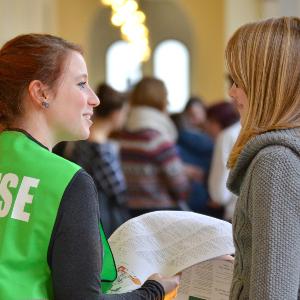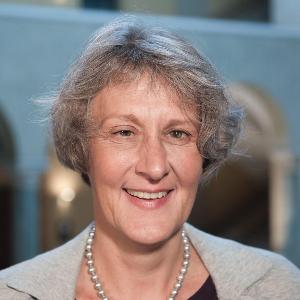Starting university: “Taking personal responsibility is more crucial than ever”
17 May 2021
An interview with Christiane Mateus, head of the Central Student Advisory Office at LMU, on the challenges of starting university.
17 May 2021
An interview with Christiane Mateus, head of the Central Student Advisory Office at LMU, on the challenges of starting university.

Starting university can be a challenging time. How does it work when it’s all virtual?
Christiane Mateus: In the Student Advisory Office we know that starting university can often be difficult on several levels. First there’s the question students naturally ask themselves: What do I want to study in the first place? Then there are the organizational matters, like applying for a place and the registration process. The last few semesters have all been virtual, so by now we are prepared for the challenges and restrictions faced by first-year students. Especially when you’re starting your degree course virtually, it’s particularly important to get all the help you need—and all the help that’s on offer.
What difficulties do students in their first semester face?
For new students, the challenges of starting their studies in a virtual world are primarily organizational in nature: How do I organize my timetable, how do I contact my lecturers, and how can I get in touch with my classmates and other fellow students? So self-organization is key here. After all, a big part of what going to university is all about is for students to take on a high degree of personal responsibility. That was already the case when we had face-to-face teaching and it has certainly intensified in the recent online semesters.
It is a question of organization, but more than anything it’s about getting yourself integrated into the LMU community as a student. In other words: How do I really make myself feel like a student? Of course, that includes everything we associate with doing a university degree: Getting an idea of who and how many others are studying with me, making friends and feeling a part of the academic world. That sounds overwhelming at first—but in fact, our lecturers, students and student councils have really made an effort in the last few semesters to welcome the first-semester students and give them a feel for the LMU community from the start.
“A lot depends on whether you’re brave enough to ask questions. In digital semesters, you’ll quickly get lost if you don’t.”Christiane Mateus
But that alone is not enough. First years and prospective students need to be actively engaged, must want to fit in, and have to be motivated in how they approach their studies. A lot depends on whether you’re brave enough to ask questions or make contact and address anything you’re uncertain about. This has always been the case, but in digital semesters, you’ll quickly get lost if you don’t.
How do Virtual Campus Days help?
Our Campus Day has always been very well received, typically attended by almost 6,000 students, parents and faculty. Now that we’ve had to switch to a digital event, we’ve expanded our event from one to four days. Our visitors will have the chance to find out about the variety of subjects offered at LMU.
During the Campus Days, we as the Central Student Advisory Office also provide information about all the steps you need to take to be able to start a degree course, and we’ll put you in touch with the right people. All the different subjects and departments have prepared taster courses and will be holding information events, and on the last two days they’ll also be running virtual information desks. In this way, students and other interested people will have the chance to get to know the departments at the beginning and then, on the last two days, can also get to know the students and lecturers virtually, asking them any questions they may have.
I should say, too, that it really makes sense to take a look at the entire range of subjects that LMU offers as one of the top universities in the world. Many departments’ subjects are actually quite different to what people are familiar with from school, and perhaps future first years will discover a subject that matches all their inclinations and interests. Another big advantage of our Virtual Campus Days is that we’re able to reach people who live further away and wouldn’t otherwise have been able to travel to Munich for the day.
How has the Student Advisory Office adapted to the need to provide everything virtually?
We have converted all of our counseling sessions to video or phone sessions, depending on the preferences of the person seeking advice. The big questions that concern high school graduates are: How do I get a place at university? How do I register once I arrive? Or how do I get started at university? We have put video messages on our website about all such general topics so that people can access them whenever they want. At the same time, we have adapted our portfolio and, of course, we are also a great deal more accessible because having online sessions allows us to reach people who are not here locally.
We’ve now turned our website into our central tool. That’s because we had some difficulty reaching school students who were seeking advice, given that schools themselves are facing major organizational challenges in the pandemic. This meant that we lacked a means of direct contact, say through information mails or posters on notice boards. Our website now offers all the information and support that’s needed for us to be as present as possible as people seek advice.
“That’s one of the biggest challenges of digitalization: It’s very easy to hide behind the anonymity.”Christiane Mateus

Christiane Mateus is head of LMU’s Central Student Advisory Office. | © Ludwig-Maximilians-Universität (LMU) München
Do you have any other tips for the Virtual Campus Days?
I really do hope that all visitors will dare to ask the questions that concern them. Because that’s one of the biggest challenges of digitalization: It’s very easy to hide behind the anonymity. I think it’s crucial to rise to this challenge, especially because you will find that you encounter it even more often in your studies. And that’s why I really want to stress that any question is welcome here. It would be a shame to miss the opportunity to ask. In fact, the same applies to the entire subject of studying in general: I’d strongly encourage all students to take a look at other departments. When do you ever have the opportunity to meet so many top scientists from all these disciplines?
Of course, the whole physical experience of the university and getting to know the LMU community is still missing from the equation. But I do think it’s comforting to know that it’s the same for all of us. Researchers and lecturers, staff and students alike are all missing our personal encounters on campus. Actually, that is already the first instance of connection with the LMU community: We are all in the same boat.